|
A Practical Gift:
Century STEM Students Design
Wheel Attachments for Classroom Tables
Lakeville
Students in a Century Middle
School STEM class have given one of their teachers the gift of flexible
classroom furniture. They designed and created a simple way to add wheels to
the bottom of tables, making them easier to move around into different
configurations in the classroom.
Everything started when
English teacher, Ms. Kallie Bernier, came to Ms. Jodie Bray’s 7th grade STEM
class with a request. She told the class she is always moving her classroom
furniture around into different configurations for different lessons. Her
furniture does not have wheels like some newer furniture in the district,
making it a hassle to move around. Ms. Bernier and Ms. Bray challenged the
students to come up with a cost-effective solution.
The students split up into
teams and got to work using the engineering design process to come up with a
solution to create an attachment that would make the tables easy to move.
The students were also required to create a product that could be
3D-printed, would take less than three hours to print, and would be able to
support the weight of a student.
The teams pitched their
ideas to Ms. Bernier’s class, which voted on the best idea. The winning
product was designed by Eloise Godwin, Lee Jensen, and Cecilia Kinny. Their
design is a cylinder with a peg on top that fits inside the bottom of a
hollow table leg. The bottom of the cylinder has a hole that fits a pegged
wheel. Using four of these 3D-printed attachments, they were able to put a
table on wheels.
“We had to revise our design
around four times,” said Godwin.
“We had to get the
measurements right so it would fit on this part of the wheel,” said Jensen
as she held up one of the wheels as an example. “Then we had to make the
walls thicker so it could hold up more weight.”
“Learning how to do the
measurements took awhile, like the diameter of the wheel pegs and the inside
dimensions of the hollow table leg,” said Kinny.
“Then I remember we had
problems where the plastic shrinks, so we had to size up the design so it
could shrink down,” said Godwin.
On Wednesday, March 29, the
three students delivered the first table in a very fun way. Jensen sat on
top of the table as Godwin and Kinny rolled it into Ms. Bernier’s classroom.
Ms. Bernier was so excited and thanked the students for their hard work.
Following spring break, the team will 3D print enough attachments for the
rest of the tables in the classroom.
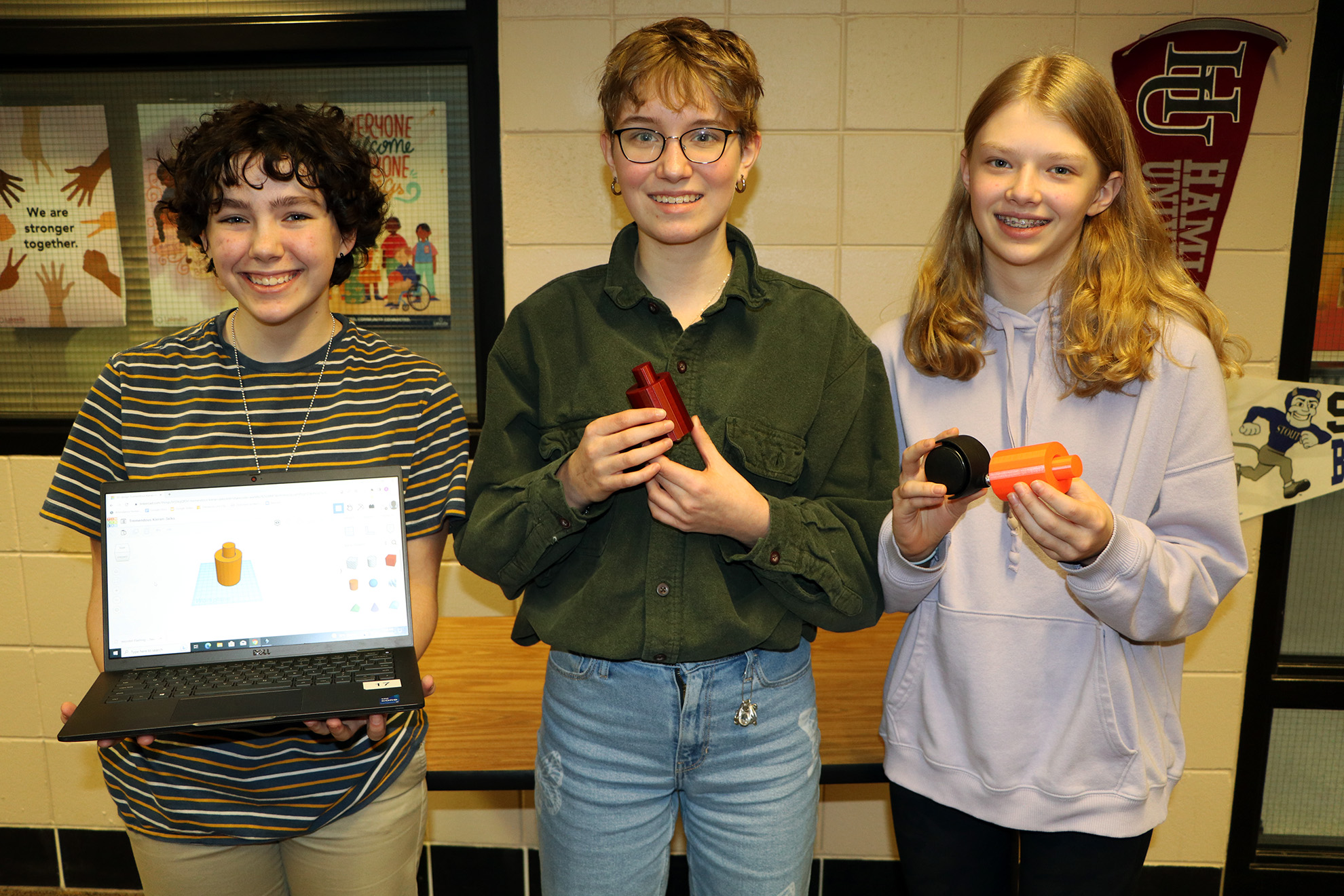
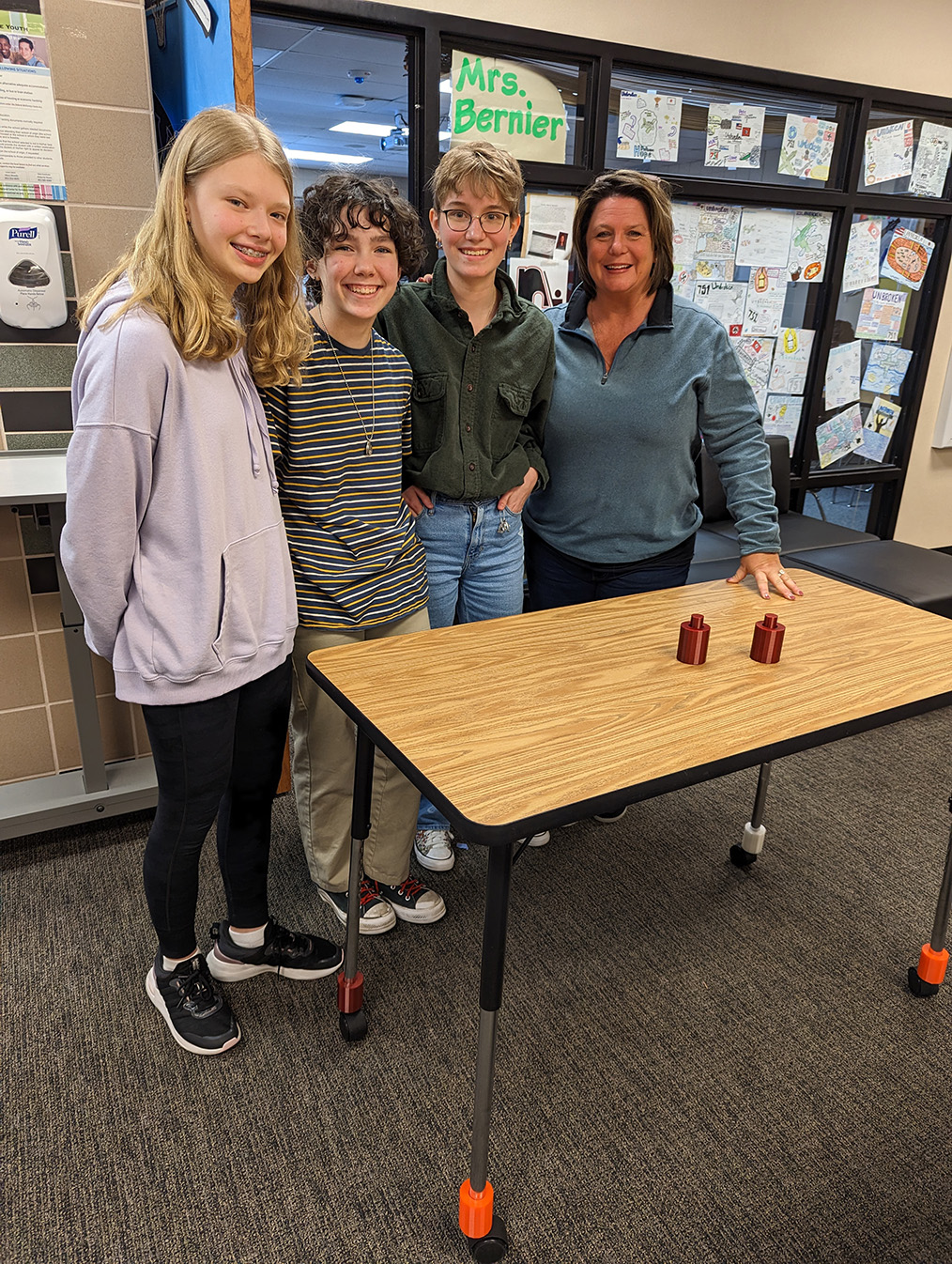
Career
& Tech Volunteer Highlight from District 916
After taking the Animal
Science and Natural Resource program at 916’s Career and Tech Center, Justin
Breister started volunteering in the classroom and improving/maintaining the
animal facilities. In the last four years, Justin has been building,
painting, cleaning, or helping out wherever he can.
“I like to create things for
the program and help whenever possible. The animals here are great to work
with and are the main reason I keep coming back.”
Animal housings, playpens,
stands, and planters have been designed and built by Justin and his Dad,
Jim, an engineer at 3M. Over the years, they have built rabbit houses, a
guinea pig playpen, mobile planters, bird cages, etc. He is
creating/building a chinchilla habitat, a new aviary, and replacing the
greenhouse gravel flooring.
Justin says his favorite
creation so far is the mobile ladder stand he built for his favorite animal,
Carmen, a parrot who is the unofficial mascot for Career and Tech. He made
the ladder stand move so when the staff is teaching about Carmen; they can
move him with ease. Carmen loves his stand so much that he has started to
chew on the ladder.
Cindy Landers, the Animal
Science and Natural Resources teacher said this about having Justin as a
volunteer: “Justin is an asset to this program. He is willing to take on any
task I ask of him, and we often brainstorm ideas for future projects.”
Through the Animal Science
and Natural Resources program, students will gain a competitive advantage in
helping animals and the environment by exploring animals and plant sciences.
Many will get a jump start on a career in Minnesota ecosystems like water,
soils, forestry, and wildlife.
Learn more about the program
here:
https://careertech.916schools.org/programs/agriculture/animal-science-natural-resources
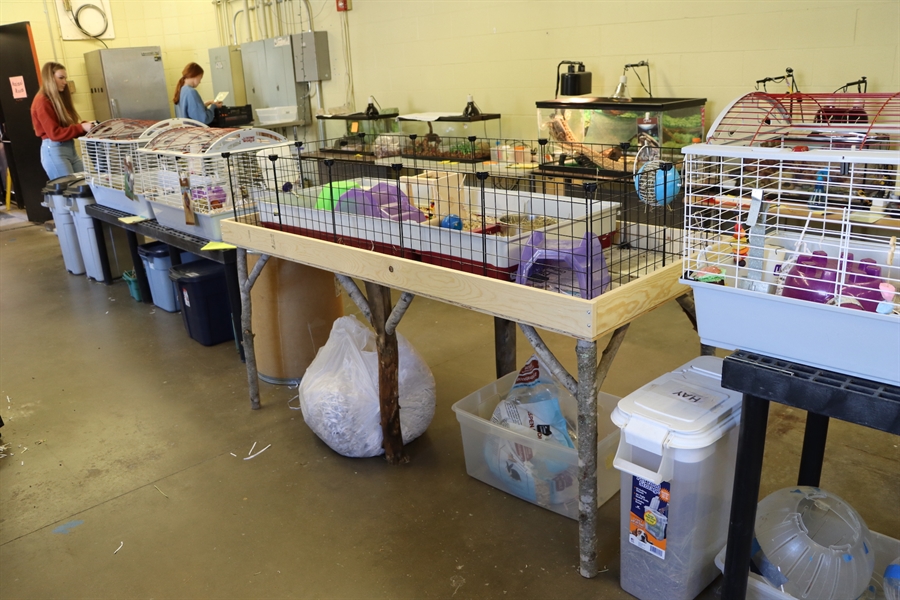
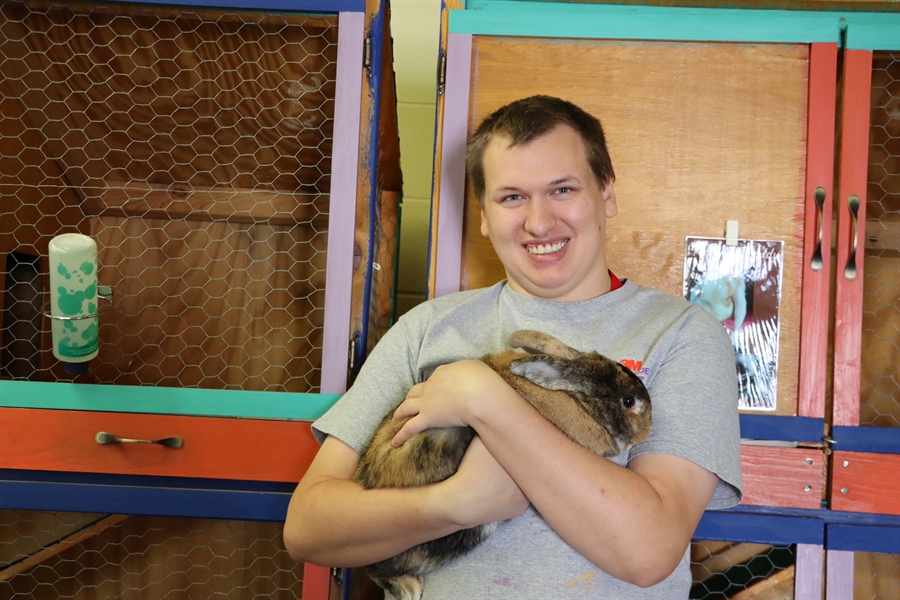
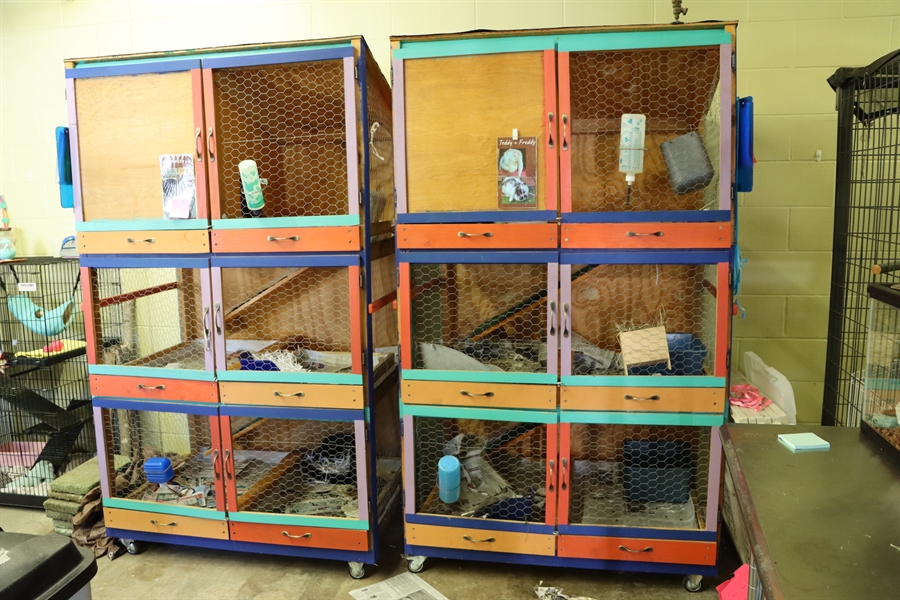
High School Students
Engineer Hope for an Underdog
Officials with the U.S.
Patent and Trademark Office (USPTO) were so intrigued by an engineering
project at Stillwater Area High School that they had to see it for
themselves. After reading an article in the Washington Post about the
incredible work of students in creating assistive devices for a 3-legged
dog, USPTO officials decided to visit teacher Matt Howe’s classroom.
The Saving Sadie project
piqued the interest of Derrick Brent, Deputy Undersecretary of Commerce for
Intellectual Property and Deputy Director of the USPTO, as well as Assistant
Regional Director James Wilson and Patent Examiner Sheree Brown. They were
excited to see the students’ designs in action and expressed how much they
admired their creativity, saying it gave them hope for the future of the
U.S. economy. The officials even offered to help the students apply for
patents that might come out of this project.
For the past several weeks,
students have been busy creating assistive devices to help Sadie, an
8-year-old Brittany Spaniel get around easier. Sadie, who lives with high
school para Nancy Schoenecker and her family, lost one of her front legs in
an accident when she was just a year and a half old. While she can run just
as fast on 3 legs as she ever did on 4, she tires quickly. She’s also
developing arthritis and could use some assistance getting around.
After researching different
types of assistive devices, drawing plans, and eventually designing a
prototype using CAD software they used 3D printers, laser cutters and other
technologies to build carts or prosthetics to help Sadie get around. Then
they put their concepts to the test and learned what worked well and what
needed improvement. Next they will make adjustments, refine their projects
and test them again. The students are hopeful their creations will keep
Sadie active for years to come.

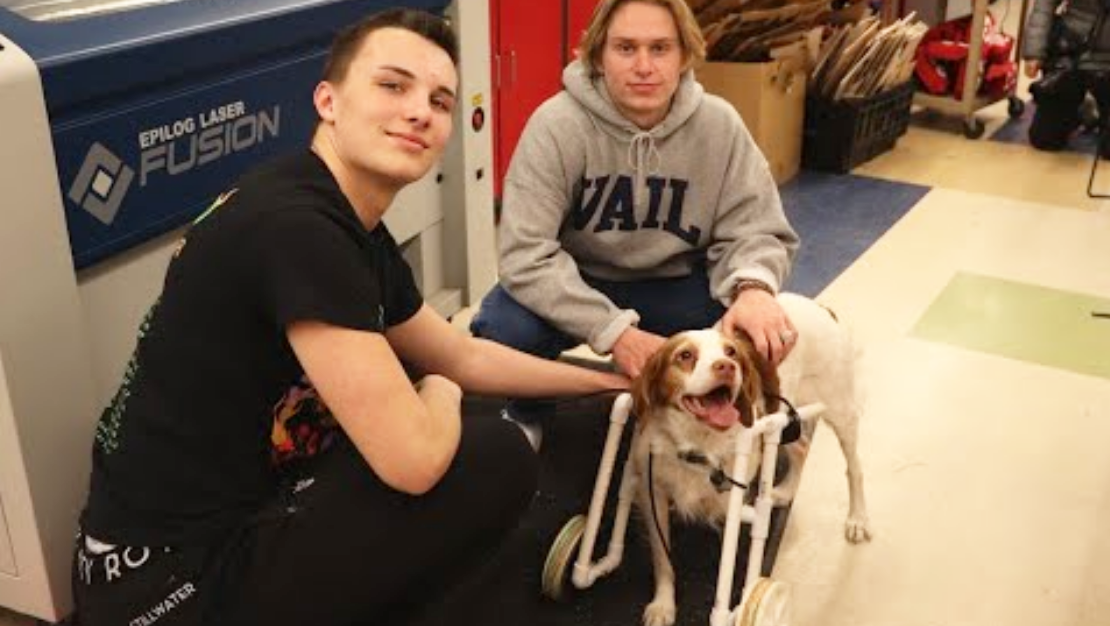
Two Sisters Cook up a Recipe for
Success
Stillwater Area Public
Schools
Inspiration can strike at
any moment. Just ask Eva Stafne, a 3 sport athlete and high-achieving
student who is a senior at Stillwater Area High School (SAHS). While
browsing through Facebook Marketplace last spring, she came across a vintage
1960s Winnebago camper for sale - and in that moment the vision for Roxy’s
Waffles food truck was born.
“My sister is always baking
and has dreamed of opening a bakery or restaurant,” Eva said. “I just knew
it would be the perfect food truck.”
Eva and her sister Miranda,
who is a freshman at SAHS, got the okay from their parents to buy the
Winnebago. Together they pooled their savings from summer jobs and
babysitting to fund the renovation from vintage camper to industrial food
truck. They developed a 5-year business plan and found investors (their mom
and step-dad), who matched their initial investment.
Over the summer Miranda,
whose middle name Roxanne influenced the company’s name, perfected the
waffle recipe and designed the menu while Eva did all of the demo and
renovation of the trailer. Eva researched the health and safety requirements
for food trucks and scoured the internet for deals on equipment. She gutted
the trailer, selling anything of value to help fund the renovations. Her
grandfather helped her with the electrical work and she watched YouTube
videos to learn how to do all the required plumbing.
When they weren’t working on
the trailer, they were researching food trucks. As a family, they visited
every food truck they could find to sample menus, talk to owners, peek into
kitchens and absorb knowledge to guide their own business plan.
“I really enjoy the business
aspect - from financing to strategy,” said Eva, who has plans to study
business and engineering but is still deciding between colleges. “It’s
exciting to see what we can do and how we can grow.”
In mid-September the pair
passed their health inspection with Washington County and Roxy’s Waffles was
officially licensed to operate.
“We passed the inspection -
basically aced it!” Eva said proudly. “That was a gratifying day. I
immediately laminated the license, hung it on the wall and we just stood
back and stared at it.”
But the pair didn’t have
long to sit back and celebrate their accomplishments. They appeared at their
first public event just two weeks after receiving their license and already
have events booked for the remainder of the fall and into the summer. They
were even one of the featured food trucks at the high school’s Pony
Homecoming Carnival.
“No one believed me when I
told them we were starting a food truck,” Miranda said. “They were all like,
‘Sure, good luck with that.’ I think people will be shocked to see us out in
the community.”
The pair have an ambitious
plan to pay off their investment in the food truck, and hopefully turn a
profit, over the next five years. But making money is only part of the
strategy. The food truck is also providing them with real-world experiences
and most importantly, it’s giving them quality time together.
“Knowing this is my last
year before I go off to college, this gives us some great sister time,” Eva
said. “It’s something we can build together. It really helps us enjoy every
moment.”
www.stillwaterschools.org/

The Glen Lake Accessible
Playground Project
Hopkins Public Schools
The Glen Lake Accessible
Playground Project is a teacher, student, and staff lead initiative with the
goal of creating a new and fully accessible playground. Key features include
a wheelchair swing and merry-go-round. This will create equitable play
opportunities to grow connections and friendships between students who use
wheelchairs, and their peers. Accessible equipment will greatly enhance the
recess and general outdoor experience for our students who use wheelchairs
AND be an incredible asset to our community.
One of Hopkins Public
Schools' core values is authentic inclusivity. When we create environments
and spaces that allow everyone to participate, we tap into our humanity by
modeling empathy for others. This is a tremendous skill for our students to
build and will inspire each student to reach their full potential while
making the world a better place.
Our students' original DREAM
BIG wish was to raise $300,000. At this level, we are able to install a
wheelchair swing, merry-go-round, and a poured in rubber surface throughout
the current playground. With the help of friends and family, local
businesses, community members, and donors, we not only met our goal, but
surpassed it. Amazing!!
They now have an even bigger
goal - to raise enough funds to build a fully accessible upper playground.
Our students are thinking creatively when imagining the possibilities. Ideas
include ramps throughout so students can access ALL areas of the playground,
sunshades for students who are sensitive to light, lowered basketball hoops
so all can play the game... the ideas are limitless!
To learn more about the
Accessible Playground Project and to donate, go to
https://www.glenlakepto.org/glen-lake-accessibility-project
www.hopkinsschools.org

| 
